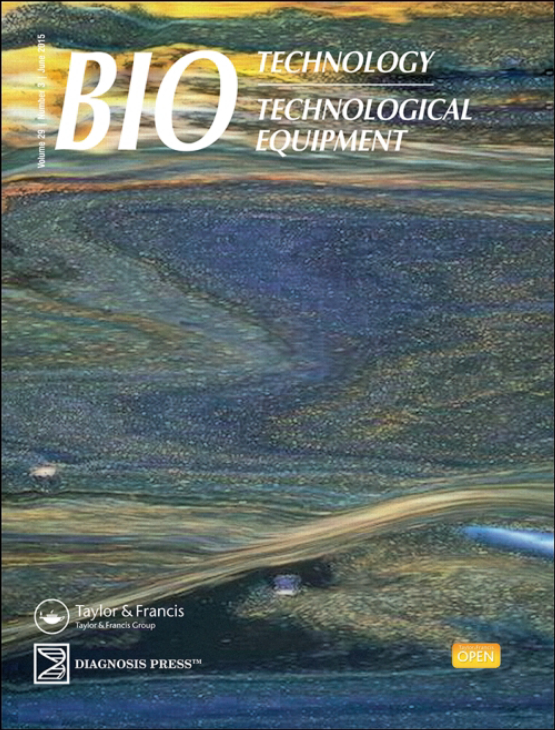Submit a Manuscript to the Journal
Biotechnology & Biotechnological Equipment
For an Article Collection on
Microbiome as a Source for Healthy Soils, Healthy Crops, and Increased Yield Potential
Manuscript deadline
02 December 2024

Article collection guest advisor(s)
Dr. Anna Karova,
Agricultural University – Plovdiv, Bulgaria
[email protected]
Dr. Mariana Radkova,
Agrobioinstitute, Agricultural Academy
[email protected]
Microbiome as a Source for Healthy Soils, Healthy Crops, and Increased Yield Potential
The microbiome, consisting of diverse microbial communities, has emerged as a critical factor influencing the health and productivity of crops. It enables the efficient use of resources in agriculture and plays a vital role in maintaining healthy soils, promoting plant growth, and increasing yield potential in agricultural systems. Microbes in the soil microbiome are involved in crucial nutrient cycling processes, contributing to soil fertility and reducing the need for synthetic fertilizers. Microbial activities in the soil contribute to the formation and stabilization of soil aggregates, enhancing soil structure. Improved soil structure increases water infiltration reduces runoff and erosion, and improves water-holding capacity, thus promoting optimal plant growth and higher crop yields. The soil microbiome plays a crucial role in carbon sequestration. Increasing soil organic carbon levels not only improves soil fertility but also helps mitigate climate change by reducing atmospheric carbon dioxide levels. Beneficial microorganisms present in the microbiome can suppress soil-borne pathogens by competing for resources, producing antimicrobial compounds, or inducing plant defenses. This natural disease suppression reduces the reliance on chemical pesticides.
To harness the benefits of the microbiome for agriculture, various strategies, including using microbial inoculants, crop rotations, cover cropping, and reduced tillage practices, are being explored. By optimizing nutrient availability, enhancing plant health, and reducing the dependence on chemical inputs, sustainable agriculture practices can be achieved. This leads to improved resource efficiency, reduced environmental pollution, increased crop productivity, and long-term agricultural sustainability.
This Article Collection aims to explore the microbiome’s numerous contributions to soil health, plant growth, and ecosystem resilience, gathering high-quality primary research articles, data notes, and reviews. Potential topics include, but are not limited to:
- Microbiome-based approaches for soil management and conservation
- Microbiome-based approaches for biological control of plant diseases and pests
- Microbial inoculants, biofertilizers, and biostimulants for enhancing plant productivity and yield potential
- Integration of microbiome knowledge into sustainable agricultural practices
- Beneficial plant-microbe interactions
- Microbial communities in conventional and organic agricultural systems
- Using microbiome data for precision management practices
All manuscripts submitted to this Article Collection will undergo a full peer-review; the Guest Advisor for this Collection will not be handling the manuscripts (unless they are an Editorial Board member).
Please review the journal scope and author submission instructions prior to submitting a manuscript.
The deadline for submitting manuscripts is 02 December 2024.
Please contact Ashley Ambros at [email protected] with any queries and discount codes regarding this Article Collection.
Please be sure to select the appropriate Article Collection from the drop-down menu in the submission system.
Anna Karova is an Associate Professor at the Department of Agroecology and Environmental Protection at Agricultural University – Plovdiv, Bulgaria. She has participated in numerous international projects focused on introduction, dissemination and development of organic agriculture in Bulgaria. Her main research interests are in the field of agroecology, biological pest control, integrated pest management, agrobiodiversity, organic farming.
Mariana Radkova is an Associate Professor in the Department of Functional Genetics, Biotic and Abiotic Stress at AgroBioInstitute, Agricultural Academy. Her research interests are focused on functional genetics in plants, including studies of genes related to seed development and nodulation in legumes, as well as agroecology research related to symbiotic nitrogen fixation and soil microbiome. Dr. Radkova is currently involved in the EU-funded Legume Generation project
Benefits of publishing open access within Taylor & Francis
Global marketing and publicity, ensuring your research reaches the people you want it to.
Article Collections bring together the latest research on hot topics from influential researchers across the globe.
Rigorous peer review for every open access article.
Rapid online publication allowing you to share your work quickly.
Looking to Publish your Research?
Find out how to publish your research open access with Taylor & Francis Group.
Choose open accessSubmission Instructions
All manuscripts submitted to this Article Collection will undergo desk assessment and peer-review as part of our standard editorial process. Guest Advisors for this collection will not be involved in peer-reviewing manuscripts unless they are an existing member of the Editorial Board. Please review the journal Aims and Scope and author submission instructions prior to submitting a manuscript.